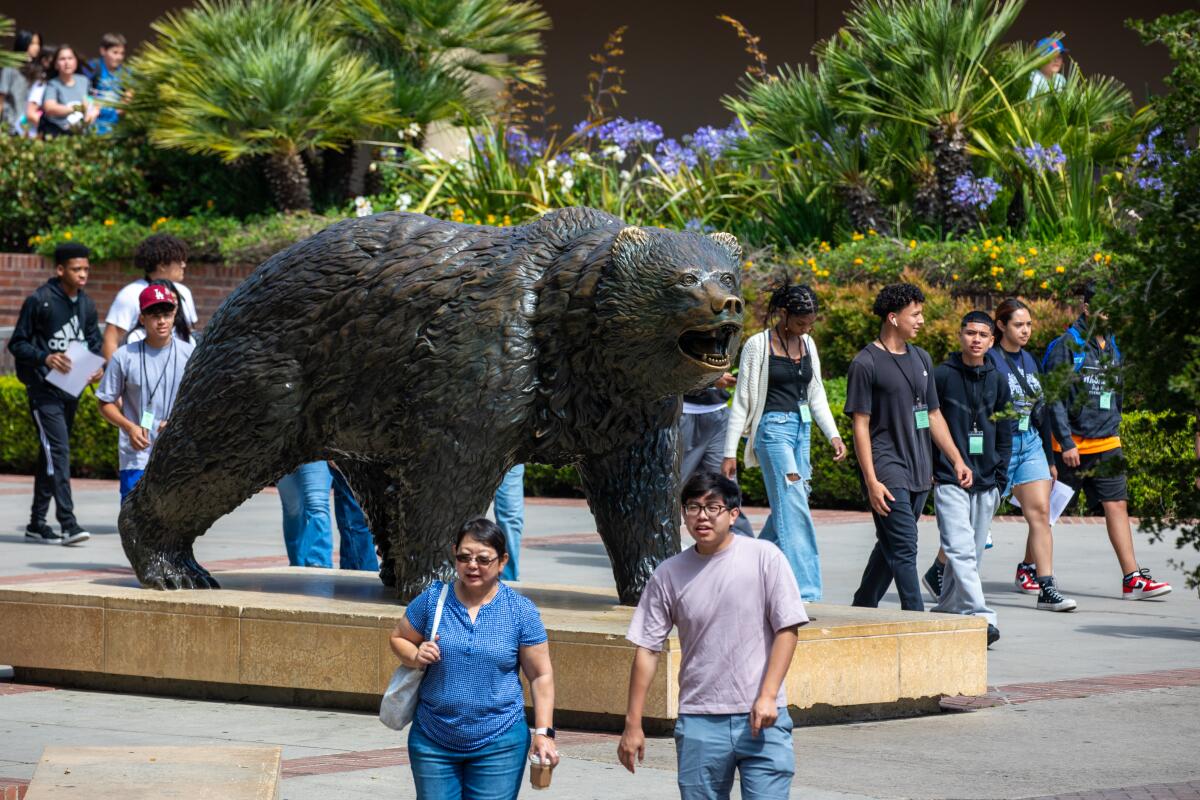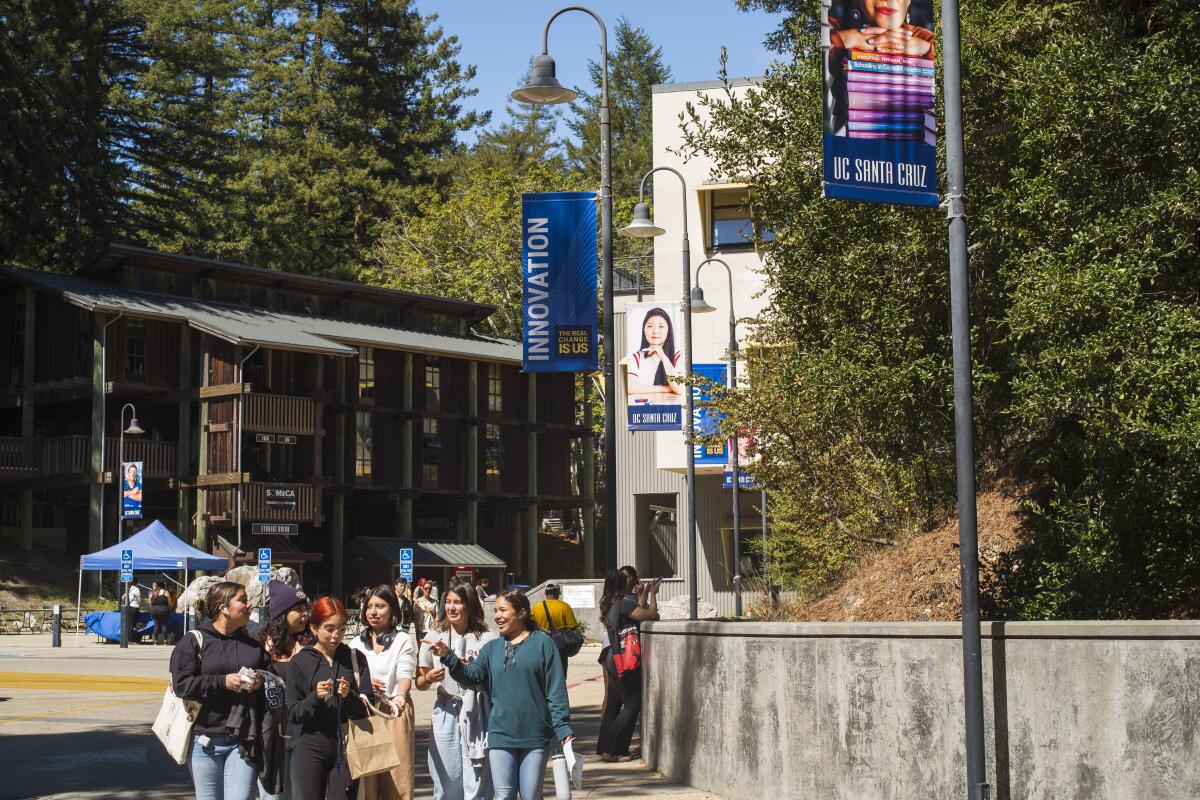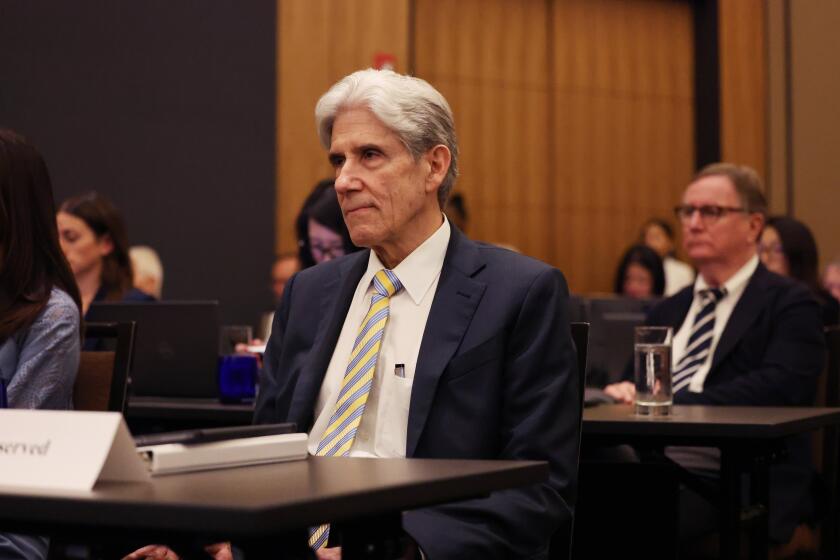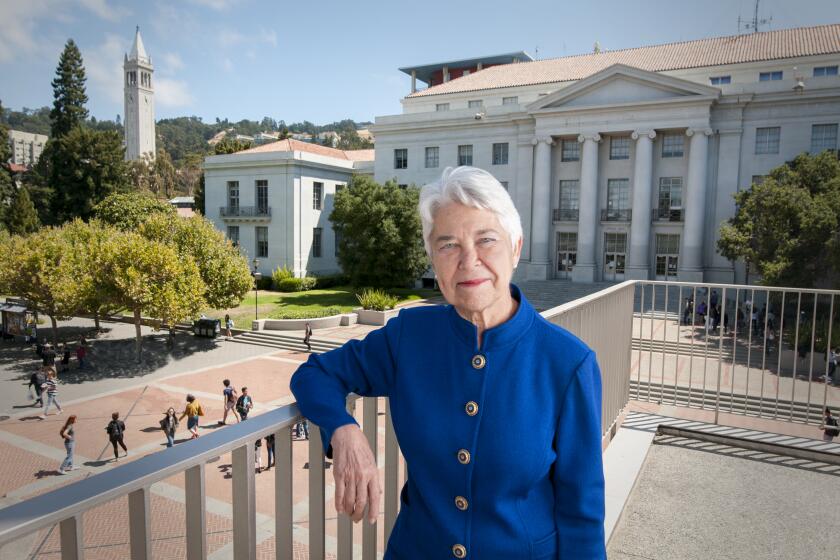UC sets new record with largest, most diverse class of California students for fall 2024

- Share via
The University of California admitted the largest and most diverse class of undergraduates for fall 2024, opening the doors of the vaunted public research institution to more California low-income, first-generation and underrepresented students of color, according to preliminary data released Wednesday.
In striking data, UC shared for the first time the gender identity of admitted students as part of its annual data release. Systemwide, women are the dominant gender among first-year students, reaching 55%. At six campuses — Berkeley, Davis, Irvine, UCLA, San Diego and Santa Barbara — the gender gap is greater, with men representing about 37% of students. UC Merced was the most evenly balanced, with 49% women and 46% men. The genders were at greater parity among transfer admits.
About 5% of admitted students identified differently — as nonbinary or transgender, for instance — or did not disclose their gender identity.
Overall, UC admitted 93,920 first-year California students, up 4.3% from last year, an all-time high amid widespread public demands to give more seats to state students after campuses began admitting a larger share of international and out-of-state applicants several years ago to raise revenue amid major state funding cuts.
The systemwide admission rate for California first-year students climbed to 70% from 68% last year. But at UCLA, the nation’s most applied-to university, the admit rate remained in single-digits, 9.5%. In total, UC offered admission to 166,706 first-year and transfer students from California and other states and countries.
For the fifth consecutive year, Latinos were the largest group of admitted first-year California students, primarily because of their dominant numbers accepted by UC Merced. At all of the other eight undergraduate campuses, Asian Americans were the leading group admitted. Overall, Latinos made up 39% of first-year Californians admitted, followed by Asian Americans at 33%, whites at 18%, Black students at 6%, American Indians at 1% and Pacific Islanders at less than 1%.
The University of California shelled out an estimated $29 million to handle this spring’s protests over the Israel-Hamas war, with 90% of the costs going toward law enforcement.
UC also increased access to low-income students, who made up nearly 41% of the admitted first-year California class; the share of those who will be the first in their families grew to 43%.
The university system also made notable gains in expanding access to California Community College transfer applicants — offering admission to 26,430, a 7.8% increase over last year. The higher admission numbers reflect a rebound in transfer applicants after a pandemic-fueled plunge. UC received 34,668 transfer applications for fall 2024, up from 31,646 last year. About 3 of 4 applicants were admitted.
“These admissions numbers demonstrate the University of California’s commitment to expanding opportunity and access, especially for historically underrepresented groups, who comprise the largest-ever share of first-year students,” said UC President Michael V. Drake. “We’re setting more California students on the path to a college degree and future success, and that translates to positive impact on communities throughout the state.”
FAFSA fiasco
This year’s admission cycle was complicated by a major fiasco: the flawed rollout of a new federal financial aid form that created significant delays in filing, receiving and processing student information to assess eligibility for financial support. Campuses are still uncertain about how many students they admitted will ultimately enroll because hundreds have still not filed their Free Application for Federal Student Aid, known as FAFSA.
“The FAFSA crisis is dwarfing and overshadowing everything,” said Jim Rawlins, UC San Diego associate vice chancellor of enrollment management. “This is what keeps me up at night.”
Rawlins said the number of students who have accepted San Diego’s admission offer but have not yet filed a FAFSA increased by as many as 400, or 60%, over last year — which could result in many dropping plans to attend because they failed to file the form and did not receive financial aid. He said his staff is scrambling to contact those students to help them along, but the federal Department of Education has not fully solved all problems — sending out a notification Tuesday that schools will not be able to submit batches of corrections to applications this cycle.
That uncertainty, Rawlins said, was one reason San Diego increased offers of admission this year — accepting 22,979 California first-year applicants compared with about 20,800 last year. But the campus also expects to add a few hundred more seats, as part of a systemwide commitment to add 2,927 California students in 2024-25. UC plans to make good on the expansion plans despite receiving $124 million less than expected under the five-year compact with Gov. Gavin Newsom and the Legislature due to the state budget deficit.
UCLA admissions stand apart

UCLA offered admission to 8,795 California first-year applicants for fall 2024, up by about 200 students over last year. That was the smallest number of offers among UC campuses. But UCLA does not need to admit as many students as other campuses to reach its enrollment targets because its rate of acceptance is high, about 60%, said Gary Clark, UCLA associate vice chancellor of enrollment management. UCLA also admitted 5,518 transfer applicants for fall 2024. The campus expects to enroll about 5,250 first-year students and 3,400 transfers.
For applicants who may see UCLA as nearly impossible to crack, with an average weighted GPA of 4.58, the transfer path is generally more accessible, with an overall admission rate of 26%. But Clark said students should be aware of the great variance among majors — the transfer admission rate for computer science is 5%, for instance, compared with 60%-plus for history, linguistics and philosophy.
Clark also reiterated that UCLA considers grades and transcripts in the context of opportunities available to an applicant. A student attending a high school without the full slate of Advanced Placement courses will not be compared with someone from a more well-resourced school.
University of Miami President Julio Frenk, a Mexico-born global health expert, will be the first Latino to lead UCLA, having won UC regents’ unanimous approval.
The Westwood campus led the way in offers to Black students, who made up 8% of all admitted California first-year applicants. UC Merced had the highest share of offers to Latinos — 45% — while Asian Americans made up at least 40% of admitted students at Irvine, Berkeley, Davis and Riverside.
Overall, UC Riverside admitted the most California first-year and transfer students — 43,016, up from 39,139 last year — as one of the UC campuses with the room to grow significantly. Riverside also accepted the largest number of students who are low-income and the first in their families to attend college.
“We really want to make sure UCR is accessible to our California residents,” said Veronica Zendejas, director of undergraduate admissions.
UC Santa Cruz admits most nonbinary students

At UC Santa Cruz, the biggest news is the robust growth in the number of transfer students the campus plans to enroll. Santa Cruz increased admission of first-year students across the board — including 35,008 Californians and 11,574 nonresidents. But Santa Cruz is planning to use most of its state funding to boost transfer student enrollment by 19%, said Michelle Whittingham, associate vice chancellor of enrollment management.
Whittingham also said transfer students who follow the requirements for units, grade point average and preparation for majors have an excellent shot at acceptance. “There is so much narrative about how difficult it is to get into UC, but if you do what we publish as criteria, you’re in” for most majors, she said.
UC Santa Cruz is also the campus of choice for students who identify as a gender other than female and male.
Across UC’s nine undergraduate campuses, 1,453 first-year California applicants identified as nonbinary; 683 of them were admitted to UC Santa Cruz. One trans applicant drove three hours from Washington state to a UC Santa Cruz recruiting event in Oregon because the campus was their first choice given its reputation for inclusivity and support for LGBTQ+ people, Whittingham said.
More offers to California applicants
UC Davis has also stepped up outreach to transfer applicants, expanding its work with community colleges, said Malisa Lee, vice provost of enrollment management. Overall, the campus increased admission offers by 4.2% to Californians from 57 of the state’s 58 counties.
UC Berkeley reduced admission offers to all categories of first-year applicants — especially international students, who declined to 751 for fall 2024 from 1,129 from last year. Offers to California transfer applicants grew by about 140.
UC Berkeley Chancellor Carol Christ is stepping down after seven years at the helm, offering provocative thoughts on enrollment growth, protests and other hot-button issues.
By contrast, UC Irvine significantly boosted admission of international first-year applicants by 33%, to 8,360 applicants for fall 2024 from 6,260 last year, with a smaller increase of 8.4% for California students. Irvine had the largest share of international students in its admitted class — 24% — and the smallest share of Californians, at 54%.
UC Santa Barbara increased offers to California students by 15.7%, out-of-state students by 11.5% and international students by 36%.
UC Merced also admitted more first-year students across the board, and led all campuses in the proportion of Californians who are underrepresented students of color, with 53% of them of Latino, Black, American Indian and Pacific Islander backgrounds.
More to Read
Sign up for Essential California
The most important California stories and recommendations in your inbox every morning.
You may occasionally receive promotional content from the Los Angeles Times.

















